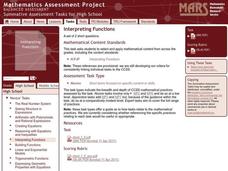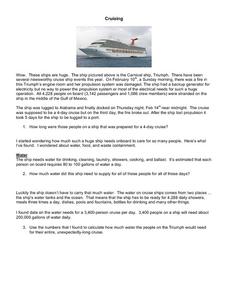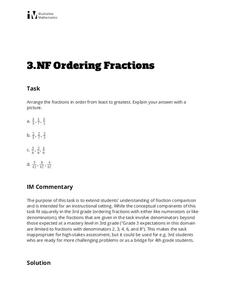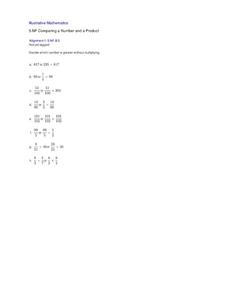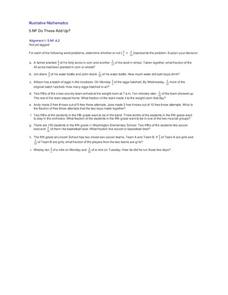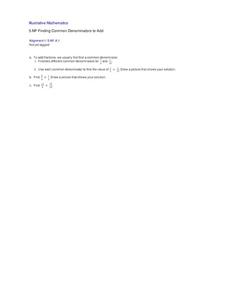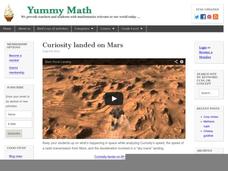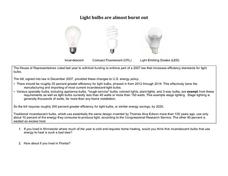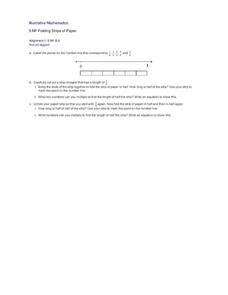Illustrative Mathematics
Sugar in Six Cans of Soda
Understanding how to multiply a whole number by a fraction is the key concept. Young mathematicians create a visual model of this real-world example and find the solution. Extensions are possible for making this an even richer activity....
Curated OER
Explaining the equation for a circle
By first starting with an explicit example of a radius and center point, this challenging lesson tries to help students gain an understanding of the Pythagorean theorem and the equation of a circle. Once they have accomplished the first...
Curated OER
Interpreting Functions
Interpreting graphs of functions is addressed in a short worksheet. Distance as a function of time is sketched on a graph, and a few quick questions ask about their meaning. This would make a good short assessment, or a nice worksheet to...
Illustrative Mathematics
Average Cost
Here is an activity that presents a good example of a function modeling a relationship between two quantities. John is making DVDs of his friend's favorite shows and needs to know how much to charge his friend to cover the cost of making...
Illustrative Mathematics
Influenza epidemic
This activity presents a real-world problem about an epidemic of influenza spreading through a city. Learners refer to a graph that shows the number of individuals infected in relation to the number of weeks that have elapsed since...
Shodor Education Foundation
Algorithm Discovery with Venn Diagrams
Here is a lesson that takes an interesting approach to analyzing data using box and whisker plots. By using an applet that dynamically generates Venn diagrams, the class forms a strategy/algorithm for guessing the rule that fits...
Curated OER
Fred's Fun Factory
Round and round and round she goes. Where she stops, nobody knows. This activity uses a common arcade game of chance, the spinning wheel, as a platform for computing expected values, interpreting results, and applying this knowledge to...
Curated OER
Solving Linear Inequalities
Walk the class through the steps of how to evaluate linear inequalities in one variable and graph the solution set. Define and discuss key vocabulary terms, then have individuals work problems of varying difficulty. Included are word...
Illustrative Mathematics
Exponentials and Logarithms II
Learners are given a logarithmic function and its inverse exponential function. The task, which is to graph both compositions of the two functions, uses the inverse nature of exponents and logarithms to generalize about the properties of...
Illustrative Mathematics
Exponentials and Logarithms I
This task focuses on using the verbal definition of the logarithm to understand that a logarithm is an exponent. Learners complete six computational exercises using the inverse properties of logs and exponents and answer two...
Shodor Education Foundation
Pythagorean Theorem
Most adults remember learning about the Pythagorean theorem, but they don't all remember how to use it. The emphasis here is on developing an intuitive understanding of how and when to use the theorem. Young mathematicians explore...
Curated OER
Cruising
Cruise ships offer many engaging opportunities for real-world math adventures. These large, floating cities use resources with numbers into the thousands place. Young mathematicians are asked to calculate numerical information...
Curated OER
Extending the Definitions of Exponents, Variation 2
Introduce the concept of exponential functions with an activity that extends the definition of exponents to include rational values. Start with a doubling function at integer values of time, then expand table to include frational time...
Curated OER
Breakfast Before School
Are the events "I eat breakfast" and "I am late for school" independent events? Assess learners' understanding of independence in a simple context with this short worksheet. Use as an opener, as part of an assignment, or discuss together...
Illustrative Mathematics
Ordering Fractions
Here is a comparing and ordering fractions learning activity that extends young mathematicians understanding of fractions with like and non-like denominators. By representing and explaining each fraction in a picture or diagram, students...
Curated OER
Carnival Tickets
A great subtraction and division discovery opportunity for young mathematicians, this learning task involves seven word problems that require multiple steps. Learners use a math table to persevere in solving problems that are...
Curated OER
The Value of Education
The real value of education is highlighted in more than one way on a instructional activity designed to not only add, subtract, multiply, and divide decimals to hundredths, but also to address the correlation between...
Curated OER
Connor and Makayla Discuss Multiplication
The commutative property of multiplication applies not only to whole numbers but to fractions as well. Connor and Makayla explore and discuss the idea that 2/3 x 3 is the same as 3 x 2/3. Your 5th grade class will connect with...
Curated OER
Comparing a Number and a Product
Mental math strategies are important for fifth graders to be able to determine the greater sum without actually solving the equations. As a summative assessment, this eight-problem worksheet can give insight into the understanding of the...
Curated OER
Do These Add Up?
Common Core mathematical practices require that young mathematicians not only know how to add fractions with unlike denominators, but also to recognize when adding fractions are appropriate for the word problem. Fifth graders are given...
Illustrative Mathematics
Finding Common Denominators to Add
Finding common denominators is an important strategy when adding fractions with unlike denominators. In the first two questions in this three-question task, fifth graders are asked to combine fractions and draw a picture to show their...
Yummy Math
Curiosity Landed on Mars
Out of this world math and science are mixed together on a worksheet that would be a great enrichment activity classrooms that are studying our solar system. The information presented is best suited toward middle school math, and...
Curated OER
Light Bulbs are Almost Burned Out
Incandescent light bulbs were enlightening more than 130 years when Thomas Edison invented them. More recently, US Congress passed legislation to increase efficiency standards. Your 5th, 6th, or 7th graders will be enlightened as they...
Curated OER
Folding strips of paper
Fifth graders need concrete experiences to introduce a unit on multiplying fractions by fractions. A strip of paper is used to create a number line and represent 5/6. It is folded first in half, and then in quarters. After unfolding,...




